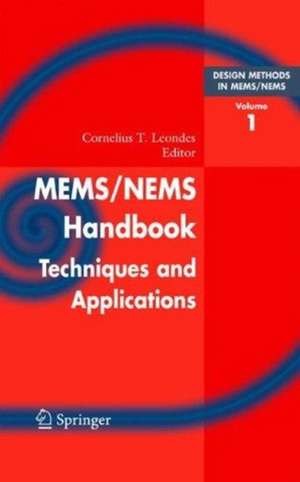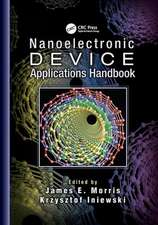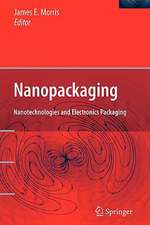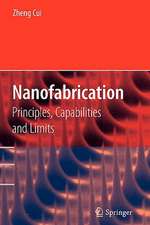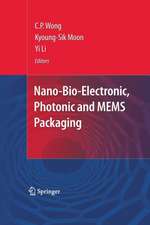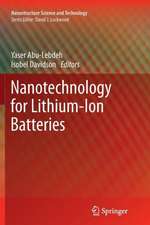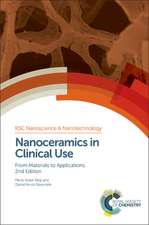Mems/Nems: (1) Handbook Techniques and Applications Design Methods, (2) Fabrication Techniques, (3) Manufacturing Methods, (4) Sensors and Actuators, (5) Medical Applications and MOEMS
Editat de Cornelius T. Leondesen Limba Engleză Paperback – 23 aug 2016
| Toate formatele și edițiile | Preț | Express |
|---|---|---|
| Paperback (1) | 2693.62 lei 38-44 zile | |
| Springer Us – 23 aug 2016 | 2693.62 lei 38-44 zile | |
| Hardback (1) | 2772.57 lei 38-44 zile | |
| Springer Us – 17 mai 2006 | 2772.57 lei 38-44 zile |
Preț: 2693.62 lei
Preț vechi: 3544.23 lei
-24% Nou
Puncte Express: 4040
Preț estimativ în valută:
515.40€ • 538.18$ • 425.62£
515.40€ • 538.18$ • 425.62£
Carte tipărită la comandă
Livrare economică 11-17 aprilie
Preluare comenzi: 021 569.72.76
Specificații
ISBN-13: 9781489977397
ISBN-10: 1489977392
Pagini: 2094
Ilustrații: XVIII, 2094 p. In 5 volumes, not available separately.
Dimensiuni: 155 x 235 mm
Ediția:Softcover reprint of the original 1st ed. 2006
Editura: Springer Us
Colecția Springer
Locul publicării:New York, NY, United States
ISBN-10: 1489977392
Pagini: 2094
Ilustrații: XVIII, 2094 p. In 5 volumes, not available separately.
Dimensiuni: 155 x 235 mm
Ediția:Softcover reprint of the original 1st ed. 2006
Editura: Springer Us
Colecția Springer
Locul publicării:New York, NY, United States
Cuprins
Manufacturing Advisory Service System for Concurrent and Collaborative Design of MEMS Devices.- Web-Enabled Knowledge-Intensive Support Framework for Collaborative Design of MEMS.- Web-Enabled Database System Development for Design and Manufacturing of Micro-Electro-Mechanical Systems (MEMS).- Techniques in Proper Orthogonal Decomposition and Component Mode Synthesis for the Dynamic Simulation of Complex MEMS Devices and Their Applications.- Techniques in Global Optimal Design for MEMS & Their Applications.- Theory and Design of Micromechanical Vibratory Gyroscopes.- A Hierarchical Design Platform for Microelectrofluidic Systems (MEFS).- Techniques in Electrostatics Analysis of MEMS and Their Applications.- Techniques for Efficient Analytical and Simulation Methods in the Prototyping of MEMS Systems.- Techniques in the Fabrication of High-Speed Micro-Rotors for MEMS Applications.- Fabrication Techniques in Micromachined Capacitive Ultrasonic Transducers and their Applications.- GaAs Thermally Based MEMS Devices—Fabrication Techniques, Characterization and Modeling.- Novel MEMS Fluidic Integrated Circuit Technology with ‘MOSFET-Like Microvalve Elements’.- Hydrogel-based ?TAS.- Crosslinked PMMA as a Low-Dimensional Dielectric Sacrificial Layer for MEMS/NEMS and Quantum Nanostructures Fabrication.- MEMS/NEMS Techniques and Applications.- Techniques in the Development of Micromachine Tool Prototypes & Their Applications in Microfactories MET Technology.- Tool-based Micro Machining and Applications in MEMS.- Micro-machined Passive Valves: Fabrication Techniques, Characterisation and their Application.- Rapid Prototyping and Rapid Tooling Techniques for the Manufacturing of Silicon, Polymer, Metal and Ceramic Microdevices.- Injection Molding Techniques for theFabrication of MEMS Elements.- Excimer Laser Micromachined Three-dimensional Microstructures—Techniques and Applications.- Techniques in Scanning Acoustic Microscopy for Enhanced Failure and Material Analysis of Microsystems.- Production Scheduling in MEMS Manufacturing.- MEMS-based Accelerometers and their Application to Vibration Suppression in Hard Disk Drives.- Micromachined Thermal Accelerometer without Proof Mass.- Techniques in MEMS Devices for Micro Humidity Sensors and Their Applications.- Modeling the Electromechanical Response of Electrostatic Actuators.- Micropumps for MEMS/NEMS and Microfluidic Systems.- FEM (Finite Element Modeling) Techniques for Electrostatic Microactuators.- Techniques in the Design of Thermomechanical Microactuators.- Techniques in MEMS Microthermal Actuators and Their Applications.- Techniques in Residual Stress Measurement for MEMS and Their Applications.- Techniques in Sonophoresis Biomedical Devices and Their Applications.- MEMS Application of Actuators and Sensors for Glaucoma Treatment.- Single-Crystal Silicon Based Electrothermal MEMS Mirrors for Biomedical Imaging Applications.- Techniques in the Development of Endovascular Microtools & Their Applications.- Techniques in the Design and Fabrication of Optical MEMS Switches and their Application in Optical Communication Systems.- Micromachining Techniques and MEMS Structures in Optical Interferometric Sensors.- Magnetic Microactuators—Techniques and Applications.- Techniques in the Design of Micro-Machined Electrostatic Torsion Micro-Mirrors and Their Applications.- Vertical Combdrive Actuator: Design and Fabrication for Micromirror Applications.- Three-Dimensional Techniques for FEM Simulations in Laser Modules and Their Applications.
Recenzii
From the Foreword:
The two most valuable features of this major reference work are the breadth of material and the depth of the topics covered. Each volume comprehensively treats a significant and specific subject area of fundamental importance to MEME/NEMS.... Collectively, this material provides tremendous resources for emerging design, fabrication/manufacturing techniques and applications of MEMS/NEMS and MOEMS.... Therefore, the energing techniques, applications, and examples of MEMS/NEMS collected by Professor Leondes in this work provide a wealth of practical ideas and methodologies designed to trigger the development of innovation. The contributors in this major reference work clearly reveal the effectiveness and great significance of the techniques available and with further development the essential role that they will play in the future.
Xuan F Zha
National Institute of Standards and Technology
Gaithersburg, Maryland, USA
July 30, 2005
The two most valuable features of this major reference work are the breadth of material and the depth of the topics covered. Each volume comprehensively treats a significant and specific subject area of fundamental importance to MEME/NEMS.... Collectively, this material provides tremendous resources for emerging design, fabrication/manufacturing techniques and applications of MEMS/NEMS and MOEMS.... Therefore, the energing techniques, applications, and examples of MEMS/NEMS collected by Professor Leondes in this work provide a wealth of practical ideas and methodologies designed to trigger the development of innovation. The contributors in this major reference work clearly reveal the effectiveness and great significance of the techniques available and with further development the essential role that they will play in the future.
Xuan F Zha
National Institute of Standards and Technology
Gaithersburg, Maryland, USA
July 30, 2005
Textul de pe ultima copertă
Micro-Electro Mechanical Systems (MEMS) is the integration of mechanical elements, sensors, actuators, and electronics on a common silicon substrate. While the electronics are fabricated using integrated circuit (IC) process sequences (e.g., CMOS, Bipolar, or BICMOS processes), the micromechanical components are fabricated using compatible micromachining processes that selectively etch away parts of the silicon wafer or add new structural layers to form the mechanical and electromechanical devices. MEMS promises to revolutionize nearly every product category by bringing together silicon-based microelectronics with micromachining technology, thereby, making possible the realization of complete systems-on-a-chip.
Microelectromechanic systems will revolutionize the design of electronics products and enable the creation of entirely new product categories. Through miniaturization, batch fabrication, and integration with electronics, this technology will enable the development of smart products by providing the required interface between the available computational power and physical world through the perception and control capabilities of micro devices or systems (e.g., microsensors and microactuators). Micromechanical devices and systems are inherently smaller, lighter and faster than their macroscopic counterparts, and in many cases are also more precise. MEMS devices are emerging as a product differentiators in numerous markets. MEMS technology is expected to have enormous opportunities in the commercial markets due to the low-cost, high functionality, and small size and weight of the devices. MEMS technology allows much more functionality to be placed within a given space than conventional technologies.
A special class of MEMS is optical MEMS technology, also referred to as MOEMS (Micro Optical Mechanical Systems). MOEMS have become increasingly important in the development of manynetworks, telecommunications and optical systems. Potential MOEMS applications include optical data storage, optical sensors, bead mounted displays and projection systems. State-of-the-art devices include torsional mirrors, digital micromirror devices, laser scanners, optical shutters, microooptical switches, and micromachined corner cube reflectors.
Nanoelectromechanical systems (NEMS) are MEMS scaled to submicrometer dimensions, to exploit the mechanical degree of freedom on the nanometer scale. In this size regime, it is possible to attain extremely high fundamental frequencies while simultaneously preserving high mechanical responsivity. This combination of attributes translates directly into high force sensitivity, operability at ultra-low power, and the ability to induce non-linearity with very modest control forces, leading to potential payoffs in a diverse range of fields from medicine to biotechnology.
The MEMS/NEMS HANDBOOK consists of five volumes and will provide a significant and uniquely comprehensive reference source for research workers, practitioners, computer scientists, students, technologists and others on the international scene for years to come:
(1) MEMS/NEMS Design Methods in MEMS/NEMS
(2) Fabrication Techniques in MEMS/NEMS
(3) Manufacturing Methods
(4) Sensors & Actuators
(5) Medical Applications and MOEMS
This landmark work features contributions from more than 100 of the world's foremost authorities on the key technologies and the greatly significant application areas of MEMS/NEMS. The contributors come from industry, government and academia.
Microelectromechanic systems will revolutionize the design of electronics products and enable the creation of entirely new product categories. Through miniaturization, batch fabrication, and integration with electronics, this technology will enable the development of smart products by providing the required interface between the available computational power and physical world through the perception and control capabilities of micro devices or systems (e.g., microsensors and microactuators). Micromechanical devices and systems are inherently smaller, lighter and faster than their macroscopic counterparts, and in many cases are also more precise. MEMS devices are emerging as a product differentiators in numerous markets. MEMS technology is expected to have enormous opportunities in the commercial markets due to the low-cost, high functionality, and small size and weight of the devices. MEMS technology allows much more functionality to be placed within a given space than conventional technologies.
A special class of MEMS is optical MEMS technology, also referred to as MOEMS (Micro Optical Mechanical Systems). MOEMS have become increasingly important in the development of manynetworks, telecommunications and optical systems. Potential MOEMS applications include optical data storage, optical sensors, bead mounted displays and projection systems. State-of-the-art devices include torsional mirrors, digital micromirror devices, laser scanners, optical shutters, microooptical switches, and micromachined corner cube reflectors.
Nanoelectromechanical systems (NEMS) are MEMS scaled to submicrometer dimensions, to exploit the mechanical degree of freedom on the nanometer scale. In this size regime, it is possible to attain extremely high fundamental frequencies while simultaneously preserving high mechanical responsivity. This combination of attributes translates directly into high force sensitivity, operability at ultra-low power, and the ability to induce non-linearity with very modest control forces, leading to potential payoffs in a diverse range of fields from medicine to biotechnology.
The MEMS/NEMS HANDBOOK consists of five volumes and will provide a significant and uniquely comprehensive reference source for research workers, practitioners, computer scientists, students, technologists and others on the international scene for years to come:
(1) MEMS/NEMS Design Methods in MEMS/NEMS
(2) Fabrication Techniques in MEMS/NEMS
(3) Manufacturing Methods
(4) Sensors & Actuators
(5) Medical Applications and MOEMS
This landmark work features contributions from more than 100 of the world's foremost authorities on the key technologies and the greatly significant application areas of MEMS/NEMS. The contributors come from industry, government and academia.
Caracteristici
The first comprehensive reference dedicated to the multi-disciplinary area of MEMS / NEMS 100 contributing authors from 19 countries Comprehensive treatment of MEMS design, fabrication techniques, and manufacturing methods Includes current medical applications of MEMS technology. Provides applications of MEMS to opto-electronic devices Broad coverage of MEMS applications in sensors and actuators Includes supplementary material: sn.pub/extras
